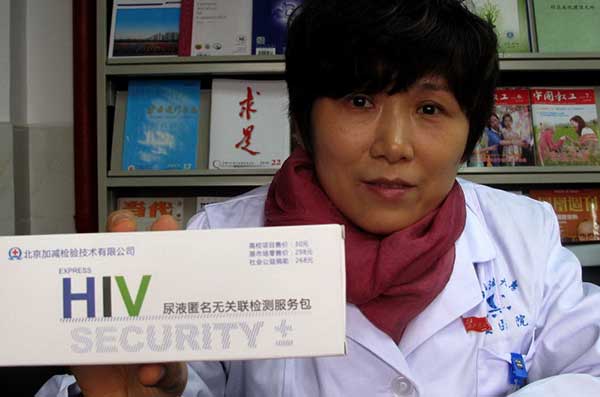Campus sells HIV testing kits in vending machines
|
A doctor at Southwest Petroleum University shows an HIV test kit available for purchase on campus.Huang Zhiling / China Daily |
Students can get results confidentially, while the apparatus costs just 30 yuan
Students at Southwest Petroleum University are able to purchase cheap HIV test kits from vending machines on campus, which also sell edible goods such as instant noodles.
The kit, which costs 30 yuan ($4.40), consists of a plastic cup and a plastic tube. The user urinates into the cup and then draws the urine up into the tube, which has a serial number.
The user can then return the tube containing their urine to the vending machine through a specific slot. Student volunteers from the university's anti-AIDS office check the two vending machines twice a day to collect returned tubes.
The tubes are sent to the university hospital, which in turn sends them to the center of disease control and prevention in Xindu district of Chengdu, Sichuan province, where the university is located.
"The center, which does not know the names of those submitting urine samples, announces which serial numbers are HIV positive or negative. A student can find out whether they are HIV positive or negative by checking the results for their serial number," said Zheng Weirong, chief of the university hospital's general office.
The kit, which was first put on sale in the two vending machines at the university in July, is part of a pilot project initiated by the China Association of STD/AIDS Prevention and Control to combat the rising incidence of HIV and AIDS among people aged 18 to 25, Zheng said.
According to the Joint United Nations Program on HIV and AIDS, China had 654,000 people with HIV at the end of September, and the infection rate among young students is rising. The most common cause of infection has shifted from drug-taking to sex.
"Sexually active young people face many temptations, which can be a result of partaking in friend-making platforms on the internet, which facilitate one-night stands and unprotected sex," Zheng said.
After unprotected sex, many students do not go to hospitals or the center of disease control and prevention in Xindu for checks, because they are afraid of a lack of confidentiality. But now, thanks to the availability of the test kit, their privacy can be protected, she said.
If students are found to be HIV positive and seek treatment early, their lives can be prolonged and a decent quality of life can be achieved, she said.
The university has posted an video online to teach students how to use the kit.
Feng Lei, a sophomore majoring in resource exploration, is a volunteer with the university anti-AIDS office. He was in charge of collecting the tubes from the vending machines on campus for a month.
The timid 20-year-old from Yinchuan, Ningxia Hui autonomous region, said he did find tubes in the machines during that month, but declined to disclose how many.
According to Li Yang, an information officer at the university, the pilot project is being implemented at 20 universities in 16 provinces, one municipality and two autonomous regions.
"The kit is only available in vending machines at universities in Beijing, Yunnan, Heilongjiang and Sichuan provinces. Southwest Petroleum University is the first and only university in Sichuan to have the kit," he said.
Feng said that when the kit was first made available at Southwest Petroleum University in July, he and many classmates were surprised.
"Thanks to publicity given to the kits by the university, we have learned more about them and deem them necessary," Feng said.


























